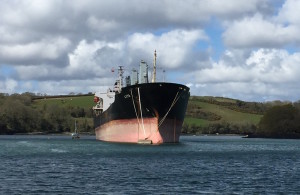 I was on the water the other day and close to this cargo vessel that was anchored while it awaited orders of where next to travel. These amazing ships travel the world carrying all manner of things that we use; usually with a small skilled crew who navigate the high seas. The ship was in calm sheltered water, yet we know from our television, films and stories the huge storms that such ships have to navigate.
I was on the water the other day and close to this cargo vessel that was anchored while it awaited orders of where next to travel. These amazing ships travel the world carrying all manner of things that we use; usually with a small skilled crew who navigate the high seas. The ship was in calm sheltered water, yet we know from our television, films and stories the huge storms that such ships have to navigate.
It is clear from the look of this ship that is has little cargo on board as it is so far out of the water. The orange part of the hull is usually hidden in the water when loaded. Whilst not visible in the picture, there will be a Plimsoll Line, probably where the black paint starts. This line is named after the British politician Samuel Plimsoll (1824 – 98). It is also called the International Load Line or Water Line. Interestingly, in 1876 load line became compulsory for all UK vessels but it was not until 1930 that there was international agreement on the universal application of load lines.
The main reason why the line was created, and became compulsory, was the loss of vessels and life through overloading. One can appreciate the balance between safety and commercially driven owners who can be too keen to maximize income by loading a vessel to its maximum and beyond. With this line it can be seen at a glance if a vessel is overloaded.
Now whilst I was looking at the scene in the picture it got me thinking about how this relates to people.
Plato said: “An empty vessel makes the loudest sound, so they that have the least wit are the greatest babblers.” The first part of the quotation I knew but not the second part. Having said that I have found some people who talk a lot can also be extremely interesting, so whilst a well know saying I think there are occasions when this may not be true.
Now this got my mind wandering further as I passed by the ship – I felt that there was a message and a lesson to learn.
On high seas the ship that is a lightly loaded is likely to be more of a handful as the vessel is so high out of the water. It will ride high on the waves and be tossed around, rather than cut through them – the extra load making the vessel much more stable.
I was talking with some people last week who seem to think that once they had left university their learning was done. Saying that they are looking forward to leaving their books to one side and getting back on with their lives and living. It is estimated that the learning will have a ‘half-life’ of about 4 years or less before it is dated.
Many mangers, professional people and leaders in the UK have had little or no management education – a frightening and true statement by the way. So some ride high out of the water wishing to be seen, making more noise, having opinion but their load of learning is just not enough to take them into the stormy waters of business. Often these are the people who seem to disappear when a crisis needs dealing with. I am sure you have suddenly found that some of the people who pontificate are not to be seen when the storms arrive.
So if we turn this imagery back on ourselves and ask one simple question:
- When was the last time we took on more knowledge, increasing our load of learning?
You may ride a little lower in the ‘water’ but have the ‘weight’ to deal with the stormy times that will arrive. As another saying goes, not ‘make a drama out of a crisis’.
So who would you prefer to have on your team – the lightly loaded vessel that rides high in the water at calm times yet gets tossed all over the place when the wind picks up, or the less high bound who will be stable in the storm, easily heading for the right port?
My best wishes,
Peter
PS A good reminder to take on some more ‘load’, and if you need some support on increasing your ‘load’ do get in touch.